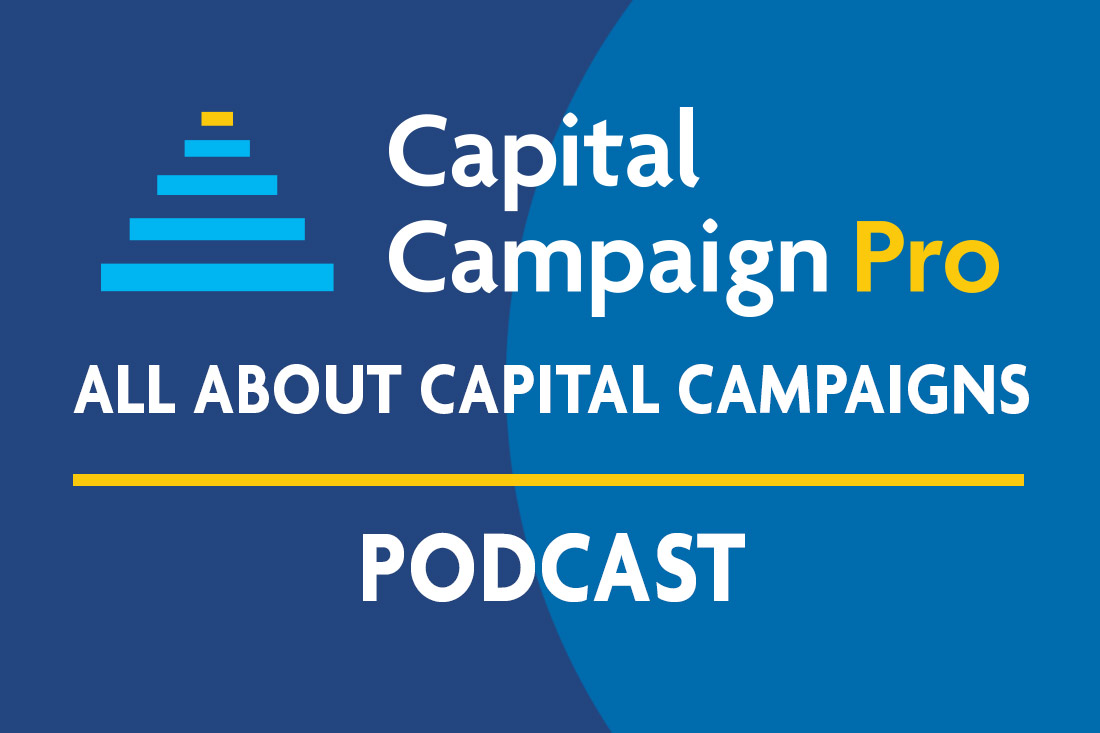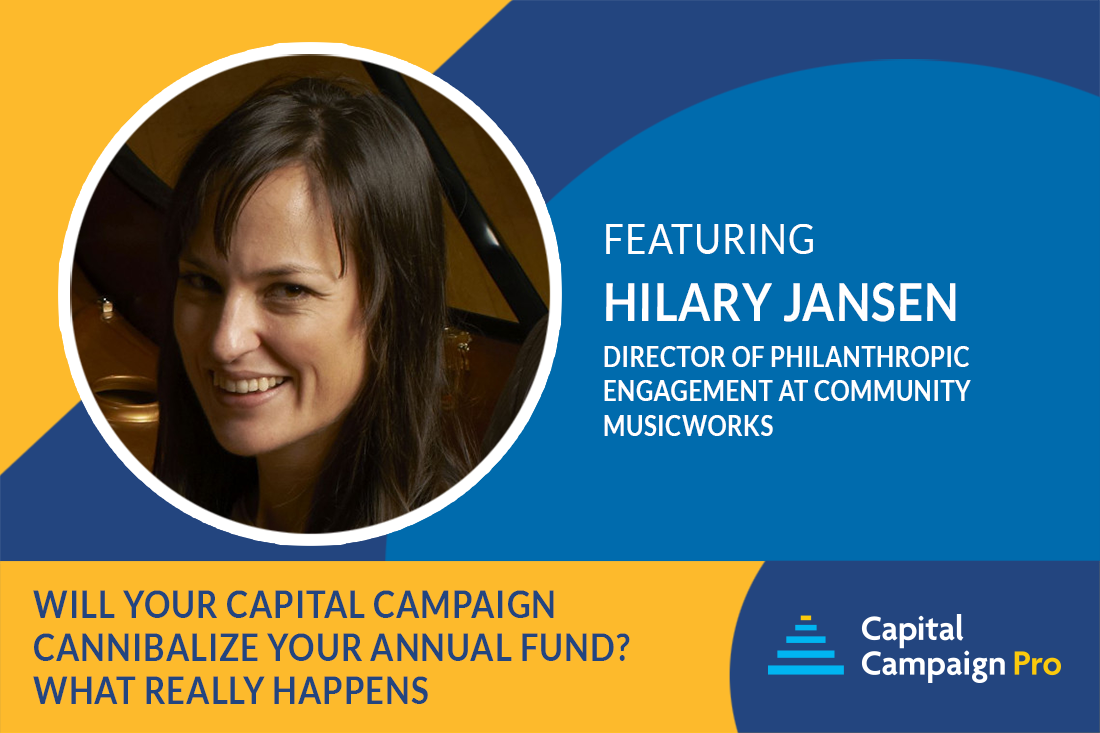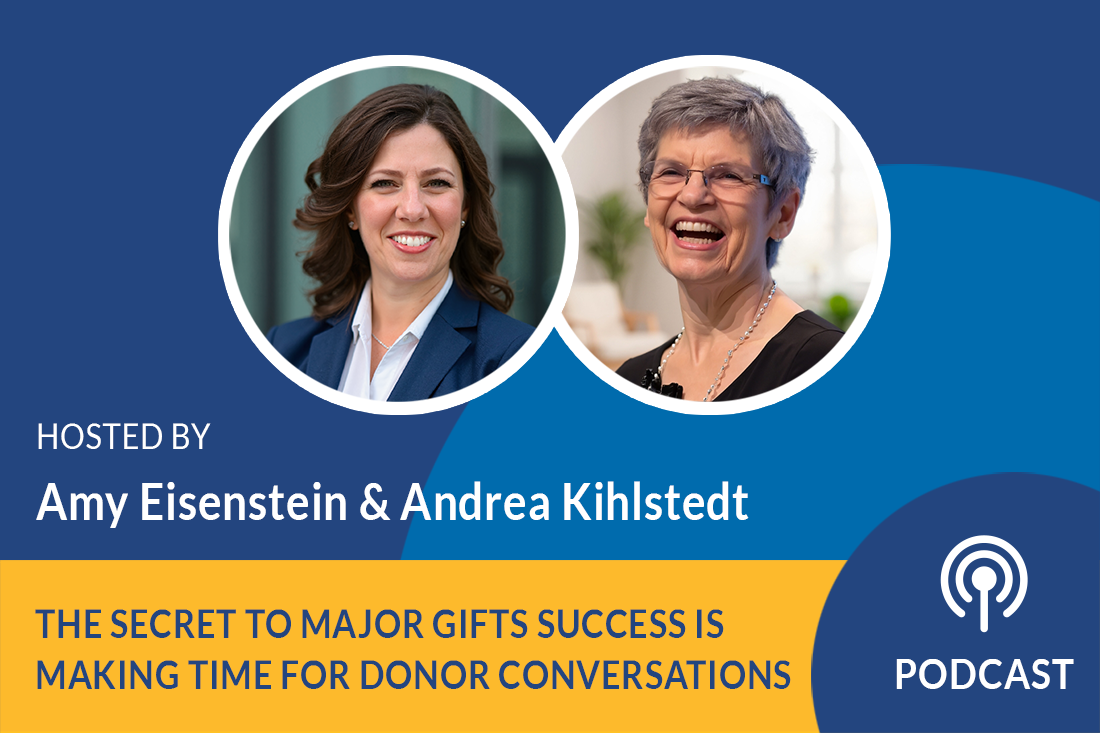Podcast: Your CEO/ED’s Roles in the Campaign and How to Set Them Up for Success

Season 2, Episode 24
Will your Executive Director have enough time for the capital campaign? Learn some practical things you can do to help make sure that the head of your organization is able and willing to pull their weight for the campaign.
Join campaign experts Amy Eisenstein and Andrea Kihlstedt as they share the tips and tricks they’ve learned over many decades of working with nonprofit leaders on this type of fundraising.
Listen Now:
This episode was recorded as part of a live webinar held Monday, January 31, 2022. To participate in future webinars, register at ToolkitTalks.com.
Amy Eisenstein:
Today’s topic, we are going to talk about the executive director, or CEO’s role in a campaign, and how you can set them up for success in a campaign. So Andrea, as always, why don’t you kick us off with your initial thoughts about that topic?
Andrea Kihlstedt:
Yes. I’m happy to do that. You know, I was thinking about this topic some, as you might imagine, and it struck me that the answer is a frustrating, it depends. But what does it depend on? Well, it depends on who your CEO or executive director is.
If you are fortunate and you have a CEO or executive director who is really willing to dive in and to be an active part of the campaign, and who happens to be really good at it, then you have one brief. Then there is one way you should function. If you have an executive director and this happens, who really has an allergy to fundraising, maybe they don’t want to do it, maybe they think it’s your job and not their job, maybe they want to do it, but they’re bad at it. That’s the worst case scenario. Then you have different kind of jobs.
Best Case: Your ED is Good at Fundraising
But, let’s start out with the best-case scenario, where you have an executive director who actually happens to be good at fundraising. They also run the organization, and their time of course is at a minimum. But you know that when you get them lined up in the right place at the right time, they will do a first-grade job of talking to donors or doing whatever it is you encourage them to do. So, your job in that situation is actually quite simple, simple to think through. Your job is to provide them with enough information and the right information, and to line them up so that they know at any given day or any given week who they should be talking to, why, what the background information is, and what the goal of that particular call or visit should be.
And when that is done well, and when there is a lot of trust between the executive director and the development director, or whoever is staffing that person, it is like magic. The executive director is making maximum use of his or her limited time to actually be talking to the most important people that he or she should be talking to. And of course, to the person that they’re talking to, they don’t know how much backup and background goes into making that happen. To them, it just feels as though they’re getting a call or a visit from the executive director. But in order to make that work really well, the executive director really needs a lot of information, so that they are well prepared and can do what it is they need to do to lead to the right result. What do you have to add to that good scenario, Amy?
Amy Eisenstein:
Yeah, I think that’s perfect. And that is the ideal scenario. Of course, we’re going to have to talk about some different varieties of executive directors because they come in all shapes and sizes, but what I thought you were going to say was, that when you have an executive director who’s excellent at fundraising and excellent in front of your donors, and limit their time as a premium, you want to hire support. And so, I thought you might say hire an assistant executive director, or an administrative assistant, or somebody else.
I think that obviously, exactly what Andrea said, but also realistically think about can they do the job that they’ve been doing for the past two, three, five years and add campaign responsibilities on top of that? And so, realistically thinking about what’s going to be delegated, how that’s going to happen at your organization, who you need to hire. Whether it’s to support the development director and the executive director, or take some responsibilities off the plate of the executive director, we can talk about how to budget for that. Certainly we’ve spoken about that on other podcasts. But, really thinking about how you’re going to support that person, I think is the moral of this story.
Worst Case: Your ED is Poor at Fundraising
Let’s talk about different kinds of executive directors, maybe some who are not quite as comfortable with fundraising, or haven’t had success yet with fundraising. You want to start there, too?
Andrea Kihlstedt:
Yes. So, Amy, I really appreciate the fact that you led off by saying part of your job is freeing up your executive director’s time so that they can do something. And that’s true whether they’re the amazing same kind of executive director you were talking to, or someone who’s perhaps not so comfortable. Finding ways to free them up, finding ways to look at their workload and offload it on to someone else, or bring someone else to support them I think really is critically important.
If you have an executive director who, for example, has just never done fundraising, they’re not unwilling. They just don’t feel confident. Then your job in part is to figure out how you can help them become confident and comfortable. What kind of training can you get them? Can you send them to programs? Can you give them some solicitation training? Can you provide them with material? Is that the kind of person who actually is willing to learn, and is willing to gather resources? If so, there’s a lot of material you can send to them. But you have to know, how does that person learn? What makes them feel comfortable? Are they comfortable just diving ahead and then talking afterwards to say, well, what worked or what didn’t work? Or, do they want to learn everything beforehand, before they try it out? That’s an interesting conversation to have with a new executive director. How can you learn?
Amy Eisenstein:
Or, one who’s been there a long, long time and just hasn’t had the opportunity or been forced to do much fundraising. I think a campaign is a good time and a good excuse to hire a coach, an executive fundraising coach, for your executive director. Someone that they can speak with. They may not want someone junior to them, the development director, teaching them how to fundraise. Maybe they will and maybe they won’t, but an outside consultant, advisor, coach, mentor who can really role play and hold their hand, and they can ask all their embarrassing questions of.
I think, a campaign when you’re raising X times more, exponentially more than you’ve ever raised before, it’s an opportunity to grow your whole team and provide real coaching and training. Probably not just sending them to a webinar, or to a one-week class, or one training. If this is somebody who really needs to learn the ins and outs of fundraising and get comfortable, frankly, it’s probably going to happen most effectively one on one, in my experience.
Andrea Kihlstedt:
Yeah, well sometimes. I’m not sure this is an either/or. It depends on learning styles. It depends on how comfortable people are on whether they want to spend that kind of money. Really, it depends.
To me, what it points to is the opportunity. You should grab an opportunity to talk to your executive director about how they learn best, what their styles are. Everybody has different learning styles.
Amy, what I know about you is that you gobble up every piece of information you can possibly gobble up to learn about things before you have to do them. I’m much more inclined just to dive in and then say, oh my God, how am I supposed to do this? And then learn from it after the fact.
Now, maybe there is a right way. Maybe your way is way better than mine. But the reality is that I am the way I am, and I know how I learn best.
Amy Eisenstein:
Yes.
Andrea Kihlstedt:
And your executive director probably does too. If you have an executive director sort of like me, who is willing to just dive in for the better and the worse of it, you might want to say, well, why don’t you dive in, and we can do some of these meetings together? And then we can talk about them, and debrief them together to see what worked and what didn’t work. Right. So, find out who people are. Don’t get upset with who they are. It just is what it is. You have to go with that, and you have to appreciate the energy that someone brings to the table.
How Your Board Can Support the ED
Amy Eisenstein:
Right. Yeah. One of the ways that we you’ve talked before about helping board members get more comfortable with asking, is practicing on each other. And I think that the same can be true for an executive director. There is a certain order of solicitation when it comes to campaign, and often we ask for the biggest gifts first. But, you can certainly ask board members first, and have the executive director, if appropriate and necessary, practice on your board members. But, it’s not really practice. They’re really asking for campaign gifts, but also having board members provide feedback.
And, I think that if the executive director and the board members have a good working relationship, it is not going to be embarrassing or problematic because they say, listen, we’re getting ready to go ask for bigger gifts than we’ve ever asked for before. So, I need to brush up my skills. And I’m going to ask each of the board members individually, maybe on a team with other board members who are going to be doing some solicitation for the campaign, and this is the real solicitation. We’re really going to ask you for your campaign gift, and we’re going to ask you to give us feedback about how we did, what felt good, what felt awkward, so that we can practice our asking skills.
Andrea Kihlstedt:
Now, don’t forget however, that no matter how good or bad your executive director is, or how experienced or inexperienced, they are going to need information. And it is the job of someone in the development shop to be sure they have the right information. You don’t want to just be sending them out on a call without letting them know, okay, what do we know about this donor? What have they given to this organization? Why do they give to this organization? What are their patterns of giving? What do we know about how they like to be treated? Everything that you can possibly gather so that your executive director goes in as well prepared as possible is incredibly important. And, many people think that all you need to tell people is how much money they’re supposed to ask for, or how much money these people have.
But in my experience, it’s the other things that are at least as important, if not more important. How do these people communicate? How do they like to communicate? Do they like to hear from you by telephone? Do they follow up immediately with email? Do they like to sit down with you in person, or are they just as happy to have a Zoom meeting? These days, that’s a perfectly good question. When they gave to us last time, what was the process by which they gave? That might point to something we can expect this time.
There’s a lot of homework. There’s a lot of preparation that the staff can do, whether you have an experienced or an inexperienced executive director to make them feel comfortable, to prepare them to be successful. And you know what, there’s nothing like success to make people like fundraising.
So, I guess the other thought that I have is, if you have an executive director who’s not experienced, be sure you set them up with the people who are likely to give first. Don’t put them with the tough people first. Put them with people where they’re going to succeed. And then talk about what that success was like, why it succeeded, how it happened. Celebrate the success. Let everyone know they solicited a gift. It really worked. They did a great up.
Order your solicitations that that person is going to do, not necessarily in terms of whether it’s the biggest gift or the most important donor, but you want to set that person up for success. And then you really want to acknowledge the fact that it was probably hard for them to go and do it because they haven’t done it much, and look how well they did when they went out there. Nothing like success.
Amy Eisenstein:
Yeah, if you have an experienced board member who’s an experienced solicitor, pair them up with your executive director. It’s often good to go in pairs. For the first two, three, five solicitations, have that experienced board member go with the executive director so that there’s a little bit of shadowing. Make sure everybody knows what their role is in advance. That’s how you set people up for success. What questions will the executive director or CEO ask? What role will they play? What questions will they ask? Who’s going to actually ask for the gift? Who is responsible for starting with the chit chat? Who’s responsible for bringing it back to the point of the meeting? Everybody has a specific role and the more prepared they feel, the more confident they will be and likely to succeed coming out of that conversation.
Brainstorm. What happens if the donor asks this, or what happens if the donor says that? What are the yes, no, maybe scenarios? What are the responses? If they say no, does the executive director hang their head and skulk away? No. They can say, all right, we completely understand. Tell us what you did have in mind, or when should we continue this conversation? Give them examples of what they should do in different scenarios. If the donor says, yes, what should the executive director do? If they’ve never been on a solicitation call before, they may say, oh my gosh, thank you so much, and get up and walk away. Maybe there’s an opportunity to talk about how that donor likes to be recognized, how that gift will be made and when.
So, go through different scenarios, brainstorm, really role play, especially on the first few asks. How do you want to wrap this conversation up, Andrea?
Wrapping it All Up
Andrea Kihlstedt:
Well, I just want to wrap it up by reminding everyone that if your executive director is inexperienced or has had a bad experience raising money, asking for money, I want to remind you that you need to be kind. Kindness actually works better than ringing your hands that they’re bad at it. And this is a difficult business for many people. It makes them uncomfortable. So, to the extent you can talk about the discomfort and let it be okay, to the extent that you can call out something that the person has done well and what the strengths of that person are, to the extent you can talk about and explore the various options, but then understand that when your director goes into a solicitation meeting, there’s only so much of that they can hold in their mind. And it’s very little, actually.
So, in the end, it has to be just a simple conversation. And it has to be a conversation where they are aiming towards asking for a gift. And after you’ve gone over everything else, we get very simple because most of us, when we’re doing something complicated and don’t know it, and don’t feel comfortable about it, most of us don’t retain a lot of detail and can’t handle it well. So, let simple be your guideline, and let kindness reign. And little by little, your executive director will get better.
Amy Eisenstein:
Excellent. I think that’s a great way to end this conversation on really setting up your CEO for success. So, thanks for that, Andrea.
Join Amy and Andrea live every Monday for Campaign Conversations, and get your questions answered in real time — Sign up here!



Leave a Comment